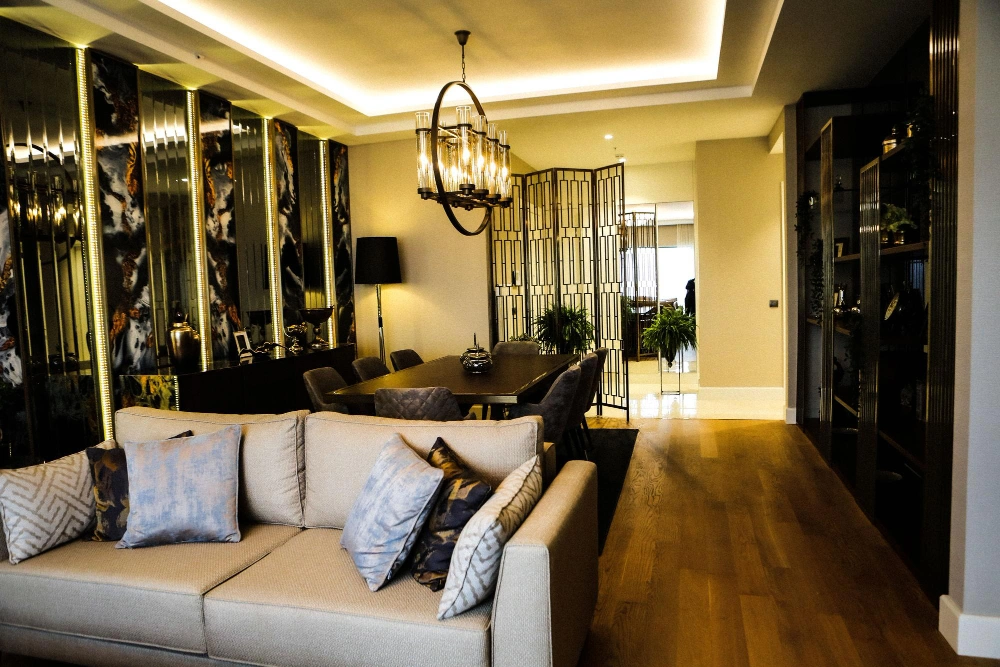The Ultimate Guide to Using Floor and Wall Mirrors for a Luxurious, Spacious Look

Table of Contents
- Introduction: The Timeless Appeal of Mirrors in Interior Design
- How Mirrors Add Luxury and Space to Any Room
- Choosing Between Floor and Wall Mirrors: What Works Best?
- Key Locations for Floor and Wall Mirrors
- Maximising Natural Light and Openness with Mirrors
- Framing Your Mirror: Enhancing Elegance with the Right Frame
- The Power of Shape: Round, Rectangular, and Abstract Mirrors
- Creating Visual Depth with Mirrors in Small Spaces
- Home Kode: Elevate Your Space with Premium Mirrors
- Designing a Cohesive Look with Mirrors and Décor
Introduction: The Timeless Appeal of Mirrors in Interior Design
Mirrors have always played an essential role in home décor, serving as both practical tools and decorative elements. Their timeless appeal lies in their ability to transform spaces, making them appear more luxurious and spacious. Whether you're working with a large living room or a small hallway, mirrors can enhance the aesthetic of any area, bringing light, depth, and sophistication into your home.
Beyond their functionality, mirrors also offer endless design possibilities. From minimalist frameless designs to ornate, statement pieces, mirrors can reflect your personal style while enhancing the overall atmosphere of your living spaces. As a design element, they are unmatched in versatility—whether you’re aiming to create a modern, sleek look or an opulent, classic feel.
In this guide, we will explore how to effectively use floor and wall mirrors to elevate your home, making it feel more open, light-filled, and luxurious. With the diverse range of high-quality mirrors available at Home Kode, achieving a perfect balance of style and function has never been easier.
How Mirrors Add Luxury and Space to Any Room
Mirrors are one of the most powerful tools in interior design for creating an illusion of space and adding a touch of elegance. Their reflective surfaces enhance the light in any room, making it feel larger and more open, while also providing a sophisticated visual effect. The strategic placement of mirrors can completely transform a room’s aesthetic, turning even the most compact spaces into airy, luxurious environments.
When placed correctly, mirrors capture natural light and distribute it throughout the room, eliminating dark corners and creating a sense of depth. This is particularly beneficial for smaller spaces or areas with limited windows, as mirrors can effectively brighten the room and make it feel more expansive. Even in larger spaces, mirrors can add an extra layer of luxury by reflecting the finer details of your décor and elevating the room's overall look.
The key to using mirrors effectively is not just in the size or shape but in how and where they are placed. Choosing the right mirror for each space, whether it's a dramatic floor mirror or a sleek wall mirror, can transform an ordinary room into a statement of luxury.
Choosing Between Floor and Wall Mirrors: What Works Best?
One of the first decisions you'll face when selecting a mirror for your home is whether to opt for a floor mirror or a wall mirror. Each option has its own distinct advantages, and the choice largely depends on the room's size, function, and design.
Floor Mirrors
Floor mirrors are perfect for making bold statements. They stand tall, typically leaning against a wall, adding height and grandeur to any room. Floor mirrors work exceptionally well in bedrooms, dressing rooms, or large living areas where they can enhance the space without the need for wall fixtures. They can also serve as full-length mirrors for outfit checks, making them both functional and decorative.
In larger spaces, a floor mirror can act as a focal point, drawing the eye and creating visual interest. For smaller spaces, a narrow floor mirror can help elongate the room, making it feel taller and more open.
Wall Mirrors
Wall mirrors, on the other hand, are incredibly versatile and fit seamlessly into almost any room. They’re ideal for enhancing light and creating an illusion of space without taking up valuable floor area. Wall mirrors can be placed in hallways, above fireplaces, in dining rooms, or even in bathrooms, providing both style and function.
Wall mirrors are available in a variety of shapes and sizes, allowing you to customise their use to your space. For example, a large rectangular mirror above a sofa can make a living room feel wider, while a round mirror in the entryway adds softness and a welcoming feel.
Key Locations for Floor and Wall Mirrors
Where you place your mirror is just as important as the mirror itself. Strategic placement can maximise the mirror’s impact, ensuring it adds both beauty and functionality to the room. Here are some of the best locations to consider:
Living Room
In the living room, a large wall mirror can be hung above a mantelpiece or console table to create a striking focal point. Floor mirrors can also be positioned in the corner of the room to reflect light and add visual depth.
Bedroom
For bedrooms, floor mirrors are ideal near wardrobes or dressers, offering both practicality and style. A large mirror placed behind a dressing table can create a glamorous, luxurious feel, while a wall mirror opposite the bed enhances light and space.
Entryway
Entryways often benefit from the use of mirrors, particularly wall mirrors that help elongate narrow hallways. Placing a mirror above a console table is not only practical for last-minute touch-ups but also helps make the space feel more inviting and spacious.
Dining Room
Mirrors in the dining room can enhance the sense of openness and create a sophisticated ambiance, especially when placed on walls adjacent to windows or near lighting fixtures. The reflection of chandeliers or pendant lights can add a touch of luxury to the dining experience.
Maximising Natural Light and Openness with Mirrors
One of the greatest benefits of mirrors is their ability to amplify natural light. In rooms where natural light is limited, placing a mirror opposite or near a window can dramatically brighten the space. The reflection of sunlight creates a more open, airy environment, making the room feel larger and more inviting.
If you’re looking to maximise the brightness in a room, consider positioning a large wall mirror where it can capture and reflect the most light. This works particularly well in living rooms, dining areas, and entryways. In darker rooms, such as those with fewer windows, mirrors can help distribute both natural and artificial light, reducing the need for excessive overhead lighting.
Framing Your Mirror: Enhancing Elegance with the Right Frame
The frame of a mirror can greatly influence its overall aesthetic. A well-chosen frame not only complements your existing décor but also enhances the mirror’s visual impact. For instance, a mirror with a sleek, metallic frame offers a modern, minimalist look, perfect for contemporary spaces. Alternatively, a mirror with a decorative or ornate frame can bring a sense of luxury and classic elegance to a traditional or vintage-inspired room.
When selecting a frame, consider the materials used in your room’s décor. Wooden frames can add warmth and texture, while metal or glass frames provide a sleek, polished finish. The key is to choose a frame that harmonises with the other elements in your room while still allowing the mirror to stand out as a design feature.
The Power of Shape: Round, Rectangular, and Abstract Mirrors
The shape of a mirror plays a crucial role in determining its visual impact on a room. Rectangular mirrors are classic and versatile, perfect for creating a structured, balanced look in larger spaces. They work well above furniture such as mantels or sideboards, adding length and symmetry to the room.
Round mirrors, on the other hand, add a soft, elegant touch, making them ideal for entryways, living rooms, or bedrooms. Their circular shape introduces a sense of flow and movement, helping to soften the hard lines of furniture or architecture.
For a more contemporary or artistic feel, consider abstract or irregularly shaped mirrors. These unique designs serve as statement pieces, adding a modern, creative edge to your home décor. They are particularly effective in minimalist or industrial-style interiors, where they provide visual interest without overwhelming the space.
Creating Visual Depth with Mirrors in Small Spaces
Small spaces often feel cramped or enclosed, but the clever use of mirrors can make these areas appear much larger than they are. By reflecting light and creating the illusion of depth, mirrors can open up even the smallest rooms, making them feel more expansive and airy.
In narrow hallways or compact bathrooms, a well-placed mirror can double the visual size of the space. Floor mirrors are particularly useful in small bedrooms or living areas, where they can create the illusion of height, giving the room a more open and luxurious feel.
Home Kode: Elevate Your Space with Premium Mirrors
At Home Kode, we believe that mirrors are more than just functional pieces—they are an essential part of creating a home that reflects your style and personality. Our carefully curated collection of floor and wall mirrors offers something for every taste, from sleek modern designs to elegant, classic frames. Each mirror is crafted with attention to detail, ensuring that it not only enhances your space but also becomes a statement piece in its own right.
Whether you're looking to create the illusion of space in a small room or add a touch of luxury to your living area, Home Kode’s mirrors provide the perfect balance of style and functionality. With our premium selection, you can elevate your home and create a space that is both beautiful and uniquely yours.
Designing a Cohesive Look with Mirrors and Décor
Mirrors are an integral part of any well-designed room, but they work best when paired thoughtfully with other elements of your décor. To create a cohesive look, consider how your mirror complements your furniture, lighting, and colour scheme. A well-placed mirror should feel like a natural extension of the room’s design, enhancing its features without overpowering them.
When designing with mirrors, balance is key. Too many mirrors can make a room feel disjointed or overwhelming, while too few may miss the opportunity to fully maximise light and space. By carefully selecting and positioning your mirrors, you can create a harmonious, luxurious environment that reflects both your personal style and the unique character of your home.











